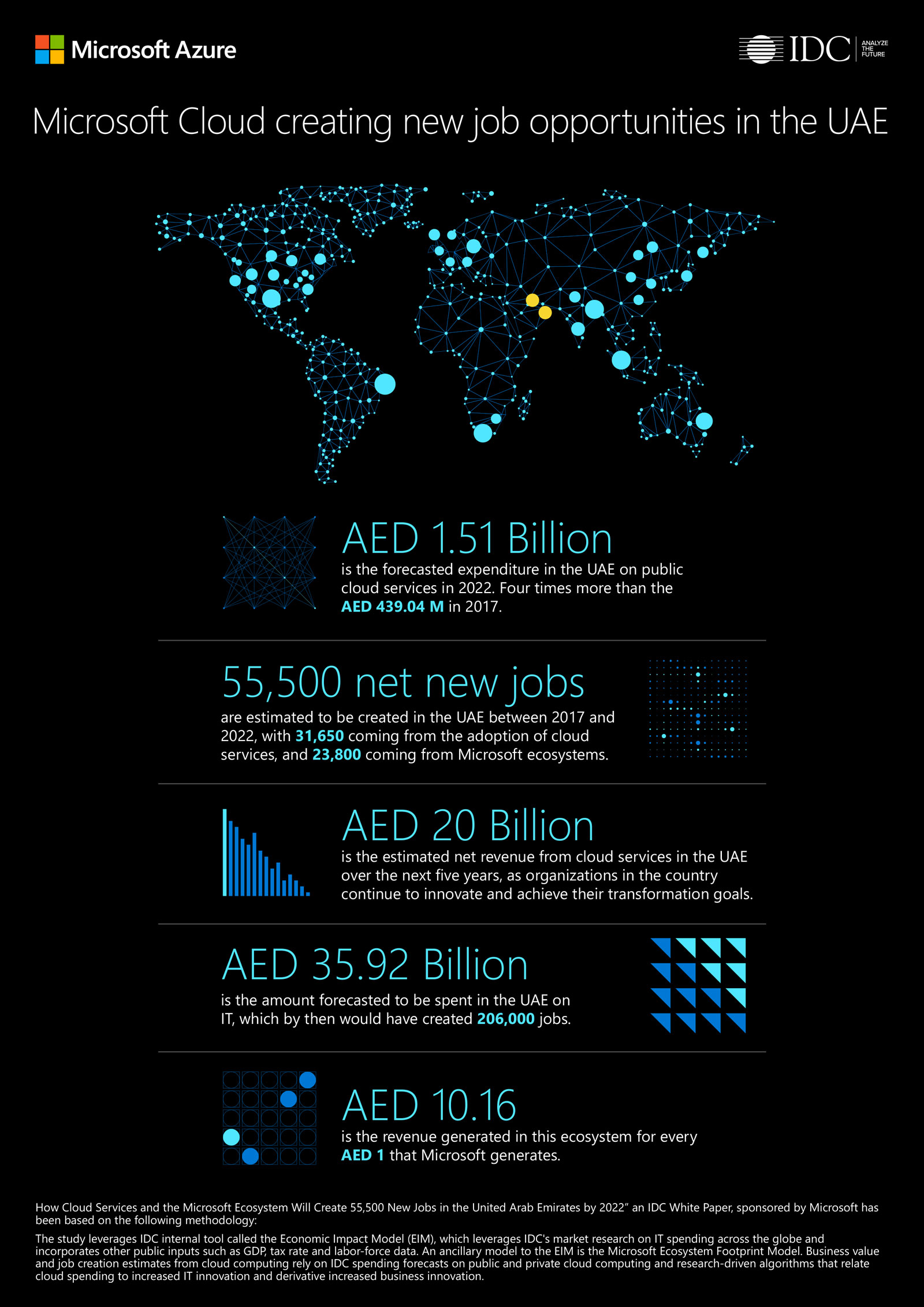- International Data Corporation draws on a decade of research to paint an encouraging picture of future employment in the United Arab Emirates
- Microsoft emerges as a prolific creator of jobs and downstream revenue in the country
- Job and revenue creation from the Microsoft ecosystem are ‘natural outcomes from our efforts to help every individual and organisation on the planet to achieve more,’ says Regional General Manager, Microsoft Gulf
3rd October 2018; Dubai, United Arab Emirates – Microsoft’s technology ecosystem and the growing popularity of cloud services will create more than 55,000 jobs in the United Arab Emirates by the end of 2022, according to new research by the International Data Corporation (IDC). The study also covers findings from other Middle Eastern markets such as Saudi Arabia, Bahrain and Turkey.
IDC’s white paper analyses the impact of ICT, cloud services, and the Microsoft ecosystem on the UAE economy between 2017 and 2022, covering a decade of IDC regional findings. The research shows that implementation of nationwide initiatives such as UAE Vision 2021 and Smart Dubai – and other initiatives focused on tourism, healthcare, transportation and education – has led to a rise in IT spending and employment.
IDC predicts spending on public cloud services in the UAE will almost quadruple over the next five years, from AED 439 million in 2017 to AED 1.51 billion in 2022. Between the end of 2017 and the end of 2022, adoption of cloud services will create nearly 31,650 new jobs (net) and the Microsoft technology ecosystem will add 23,800 jobs (net) for a total of 55,450 in net job creation. The Microsoft ecosystem – the companies that sell, service, deploy, or otherwise work with Microsoft products – supported more than 71,250 workers in 2017. The ecosystem itself is a prolific generator of downstream revenues, accounting for AED10.16 for every AED 1 that Microsoft produces, according to IDC estimates.
IDC analysts also investigated the possible knock-on effects of cloud adoption. The use of public cloud services, combined with investments in private and hybrid cloud solutions, will “enable organizations in UAE to innovate and achieve their [digital] transformation goals,” the White Paper posited. The benefits emanating from this digital transformation trend are set to generate around AED 20 billion in net new revenues over the next five years.
“Digital transformation has the power to engage customers and citizens, empower employees, optimise operations and reinvent products and services,” said Sayed Hashish, Regional General Manager, Microsoft Gulf. “IDC’s report clearly shows that private and public organisations have realised these benefits, and are directly or indirectly creating jobs as they invest in their futures. Microsoft is proud of its record of job creation in the UAE, the wider GCC and beyond. Acceleration of economic growth and innovation and the downstream revenue that comes from the Microsoft ecosystem are natural outcomes from our efforts to help every individual and organisation on the planet to achieve more.”

In March, Microsoft announced that it would open dedicated cloud datacenters in Abu Dhabi and Dubai to serve customers across the Middle East and Africa. These datacenters coming with huge investment are the first Microsoft datacenters in the Middle East. The company believes the provision of cloud services through regional data centres will help start-ups to more quickly realise their potential, as well as accelerating the adoption of public cloud services within government agencies and regulated industries such as banking and finance, telecoms and healthcare.
Microsoft also takes very seriously its role in upskilling and reskilling the existing workforce to support an emerging series of jobs and shifts in responsibilities resulting from the increased use of cloud services. According to the World Economic Forum’s “Future of Jobs” report, published in January this year, two in three children will end up working in jobs that do not exist yet. Microsoft is active in creating awareness of this with our education partners around the world. The company also runs several professional programmes that address the need for upskilling and reskilling to plug knowledge gaps in the emerging cloud services segment, including Microsoft Cloud Administration, Azure Essentials and the AI Professional Certification. Cloud Society is mass readiness program for IT Professionals, Developers and Data Professionals to learn Cloud technologies, best practices and advance their careers. There are also face to face readiness opportunities such as Gulf Datacenter Community meetups.
In its whitepaper, IDC also examined wider ICT spending in the UAE, and predicted it would reach AED 35.9 billion in 2022, and that IT employment in the country will surpass 206,000 by that time.
“As cloud continues to gain momentum in the region, countries will be able to accelerate their digital transformation and economic diversification agendas.” said Megha Kumar, Research Director – Software & Cloud, IDC Middle East, Turkey and Africa. “Cloud will enable innovative projects that revolve around artificial intelligence (AI), enterprise mobility, Internet of Things (IoT), and blockchain. It will also create demand for new skill types and expertise in the market. We will begin to see a shift in the job types that will be needed by organizations, with new roles coming in to play. These will range from AI and blockchain architects and data scientists to AI systems trainers.”






